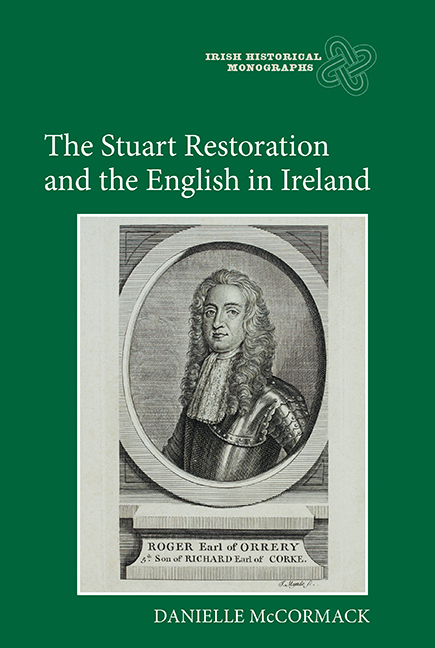Book contents
- Frontmatter
- Contents
- Miscellaneous Frontmatter
- Acknowledgements
- List of abbreviations and conventions
- Introduction
- 1 The political and mental map of 1660s Ireland
- 2 Stuart restoration and the beginnings of Protestant discontent
- 3 Roger Boyle, earl of Orrery, and the evolution of English Protestant identity in Ireland
- 4 Moral and rhetorical challenges to Protestant power
- 5 Charles II and his ministers in Ireland
- 6 The court of claims, popery and Stuart authority
- Conclusion
- Bibliography
- Index
5 - Charles II and his ministers in Ireland
Published online by Cambridge University Press: 05 July 2016
- Frontmatter
- Contents
- Miscellaneous Frontmatter
- Acknowledgements
- List of abbreviations and conventions
- Introduction
- 1 The political and mental map of 1660s Ireland
- 2 Stuart restoration and the beginnings of Protestant discontent
- 3 Roger Boyle, earl of Orrery, and the evolution of English Protestant identity in Ireland
- 4 Moral and rhetorical challenges to Protestant power
- 5 Charles II and his ministers in Ireland
- 6 The court of claims, popery and Stuart authority
- Conclusion
- Bibliography
- Index
Summary
On his arrival in Ireland in July 1662 the duke of Ormond was heralded as a saviour. Hearing confirmation of his appointment as lord lieutenant, the House of Lords wrote to Charles that ‘Never did Kingdom conceive a greater Hope of a Lieutenant, that he will prove a Repairer of all our Breaches, and a Restorer of our former Peace and Tranquility.’ Orrery, in his speech on giving up the sword to the lord lieutenant, stated that the kingdom needed all of his ‘abilities to Act the good which is to come’. The Catholic bishop of Ferns, Nicholas French, described Irish Catholics’ hope that Ormond ‘would as yet give them a day of rejoycement and hapyness’, choosing his expression in order to heighten the sense of disillusionment that was to follow.
Ormond occupied a difficult position in Irish politics, looked to by several interests as the person upon whom fortunes were made or broken. In 1663, he complained to the English lord chancellor, the earl of Clarendon, that though he had ‘the good luck to bee beleaved to have a desire to please everybody, [he had] of late the ill luck to please nobody’. Ormond was clearly the single most influential court and government figure in 1660s Ireland. His arrival in the kingdom in July 1662 marked the beginning of a sustained attempt on the part of the monarchy to assert its power there and to end its dependency on men associated with the Interregnum regime. Royalism in Ireland was defined in relation to the duke. William Sheridan's funeral sermon for Sir Maurice Eustace extolled Eustace's virtues and loyalty to monarchy. However, with an eye to present circumstances, it emphasised that the late lord chancellor's loyalty was linked to his relationship to Ormond. Referring to the early 1640s, Sheridan stated:
But when Pride and Ambition began to contend with Loyalty and Obedience … this Mirrour of Loyalty was no less serviceable to His Majestie, by his assisting the now Lord Lieutenant with his private counsel, than he was before in his publick capacity.
- Type
- Chapter
- Information
- The Stuart Restoration and the English in Ireland , pp. 107 - 133Publisher: Boydell & BrewerPrint publication year: 2016



